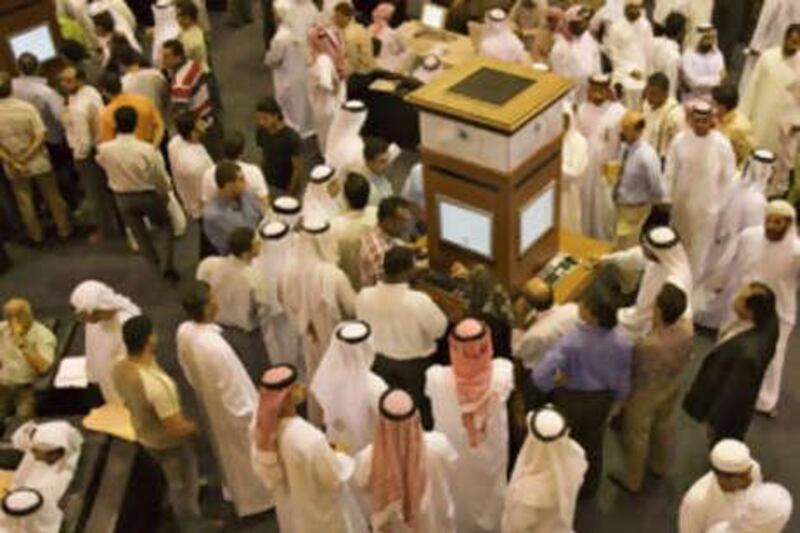DUBAI // Fewer IPOs, a lack of transparency and proper disclosure, and better investment opportunities in Ajman and Abu Dhabi property markets are some of the reasons analysts are giving for a lacklustre Dubai bourse this year. External factors, including tensions between the US and Iran over the latter's nuclear programme, and the global credit crunch, were also mooted as problems behind the Dubai Financial Market's (DFM) traded value falling almost 42 per cent this year, and the general index dropping 7.04 per cent.
Analysts and fund managers also said that traditional low trading volumes in summer and Ramadan would minimise the chances of the Dubai index making a comeback in the third quarter. Saudi Stock Exchange's Tadawul and the DFM General Index are the only two to lose ground this year. Kuwait, Oman, Bahrain and Doha markets have all gained, capitalising on the positive ending of last year. Tadawul, the worst performing equity index, is expected to gain ground, with analysts predicting a spur in trading if major listed firms like Sabic can post better than expected financial results for the first half. Tadawul is trading at 9440.39, down about 15.5 per cent from its peak of 11,175.96 at the beginning of the year.
But Arab Monetary Fund data show the DFM's traded value has fallen from $11.09 billion to $6.44 billion at the end of the first half, almost 42 per cent. DFM capitalisation, however, has risen by 5.47 per cent to $137.24 from $130.12 for the same period. "[But] we have to realise the increase in market capitalisation has come from the firms increasing their capital. It is not due to trading activity," said Wadah al Taha, a market analyst based in Dubai.
"Saudi investors are holding back, as they want to reposition their portfolio according to financial performance of the listed firms," he said. "Investors there are mature and follow the fundamentals, unlike Dubai investors, who are sentiment driven." Mohammed Ali Yasin, the managing director of Shuaa Securities, said the DFM was suffering due to a lack of IPOs and the flight of liquidity for more attractive investment opportunities in the booming Abu Dhabi and Ajman property markets.
"We need IPOs like Ajman Bank. IPOs are a good stimulant for trading," he said. He disagreed with Shehab Gargash, the managing director of Daman Investments, who said that the quality of disclosures and lack of information from firms like Dubai Islamic Bank and Deyaar - both the subject of investigation - were forcing the market towards a "crisis of confidence". Mr Gargash also on Sunday urged the government and the market regulator, ESCA, to force firms to be fair and transparent with their investors.
"Quality of disclosure remains an issue I agree, however lack of information is hurting only the DIB and Deyaar stocks, and not the market in general," Mr Yasin said. "Market is impacted more by outside factors than performance of the listed securities or issue of disclosures." Mr Yasin was upbeat that the Dubai market would turn around by the fourth quarter, and attributed the lack of liquidity during the second quarter to "investors' nervousness" due to the global credit crunch and the dilution of equities value in international markets.
"Foreign Institutions make 20 to 35 per cent of total liquidity in the market. Lack of their participation is surely impacting the trade here," he said. Mr Taha, however, said the correlation between international and gulf bourses was weak, as markets here moved more on regional issues than international concerns. "Geopolitical issues are of more concern here. The escalation in the Iran-US rift could hurt the markets across the board."
He said the bulk of liquidity came from regional investors and a lack of activity by foreign institutions was not a "deciding factor in determining the trade pattern or index movement". Mr Taha said the UAE markets were currently at an acceptable price to earnings level, but were expected to be range-bound in the third quarter of the year, with prospects of an upsurge in the fourth. The combined traded value for both the UAE markets was Dh366bn, which is 66 per cent of all trading last year, at Dh554bn. The bulk of trade was generated in the first quarter.
The monthly trade value average for Dubai and Abu Dhabi markets was Dh61bn, and if the markets maintained the same average, they were on target for a record Dh736bn. "Despite a decent start at the beginning of the year, UAE markets have underperformed," Mr Taha said, adding that analysts had expected a monthly trade value average of between Dh70bn and Dh75bn. In contrast, the Dubai/Abu Dhabi Securities Market has gained 11.97 per cent so far this year.
@Email:skhan@thenational.ae






